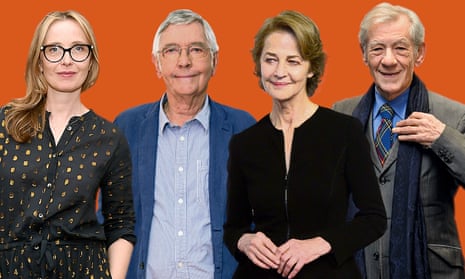Epic times for the acting community, as the showbiz gods decree that the Oscars will be the locus for the various culture wars that Hollywood has battled tirelessly not to make movies about.
A sort of Ragnarok for people with no-eye-contact clauses, the row over this year’s ceremony has expanded rapidly from the race discrimination controversy that initially engulfed it when the major awards categories were revealed (for the second year running) to include no nominees of colour. Now, thanks to acts of war by various well-meaning subclinical narcissists, there are four clear theatres of Oscar conflict: racism, sexism, ageism and homophobia. Or five, if you count “racism to whites”, as steel-trap-minded Charlotte Rampling does.
All actors are now required to pick one and deploy immediately, with those currently hedging their bets by wondering whether the Oscars aren’t maybe a bit of “all of the above” likely to be first up against the red carpet come the showdown. Or even by the time we get to the gifting suites.
Arguably, the second least appealing faction is the ageists, who are really fighting as if they have nothing to lose, and appear in some cases to be attempting to make an alliance with the racist-against-whites militia, with faintly excruciating results. Take Rampling’s 45 Years co-star Tom Courtenay, who might have been making some kind of philosophical point when he observed of himself and Michael Caine: “We didn’t get a nomination so I think they’re ageist and not racist.”
Remember, kids: it’s a zero-sum game. During Sunday’s Evening Standard British Film Awards, Courtenay was on stage to accept the Best Actress award on Rampling’s behalf, and signed off by remarking tartly: “Charlotte would be very pleased to hear that Idris Elba won Best Actor.” Oof. Unfortunately, she can’t be here tonight as she’s playing a chorus line Black Panther in Beyoncé’s Superbowl performance.
Speaking of fellow ageism victim Michael Caine, the latter has been urging black actors to “be patient”, mostly going on to reprise a shtick he knackered back around the time he got Best Supporting for The Cider House Rules, which involves him observing graciously: “It took me years to get an Oscar – years.” Well, yes. I’d have thought someone would have gently cleared it up for him back then, but if it falls to Lost in Showbiz to point out that the period between The Man Who Would Be King and Hannah and Her Sisters was by and large a shitstream of legendary proportions, then so be it.
Moving on, there appears to be some debate as to whether the Todd Haynes-directed Carol wasn’t nominated because of homophobia or sexism. If it was sexism, it would fall under the operational command of Julie Delpy, who reacted to the #OscarsSoWhite row by declaring: “Two years ago, I said something about the Academy being very white male, which is the reality, and I was slashed to pieces by the media. It’s funny – women can’t talk. I sometimes wish I were African American because people don’t bash them afterward. It’s the hardest to be a woman. Feminists is something people hate above all. Nothing worse than being a woman in this business. I really believe that.”
Julie has since apologised for how she expressed herself, but space constraints mean we must be moving right along to our final category.
Here, our four-star general is Sir Ian McKellen, who can always be relied on to bring more mischievous nuance to his provocations. A decade ago, for instance, he appeared (rightly) unconvinced by Academy posturing on race, despite that one night on which they gave Halle Berry and Denzel Washington Oscars, then wheeled on Sidney Poitier for an honorary for good measure. “A couple of years ago I was sitting in the Kodak Theatre with my acceptance speech in my pocket,” remarked Sir Ian back then, “waiting to get up and say that I was the first openly gay actor to win an Oscar. Unfortunately, that was the year the blacks won.” This year, McKellen has returned to this theme by pointing out that homophobia is as much of a problem as racism in Hollywood. “How clever, how clever,” he remarked drily of Oscar-winning performances by Tom Hanks, Philip Seymour Hoffman and Sean Penn as gay men. “What about giving me one for playing a straight man?”
Reading all these heated interventions, you could almost imagine the Oscars were under existential threat – though nothing could be further from the truth, of course. Perhaps the last word on the whole deathless controversy should go to Tim Burton. Asked recently to opine on one or other of these Oscar discrimination rows, he appeared to see a silver lining for those who worry they may have been affected. “They should be happy,” he pointed out, “because they don’t have to attend that shit.”

Comments (…)
Sign in or create your Guardian account to join the discussion